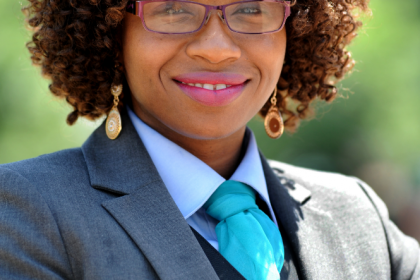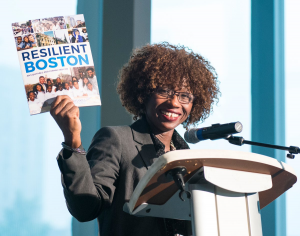
 Thank you to Dr. Atyia Martin of All Aces, Inc. for contributing this guest blog for this year’s 21-Day Racial Equity Challenge!
Thank you to Dr. Atyia Martin of All Aces, Inc. for contributing this guest blog for this year’s 21-Day Racial Equity Challenge!
There is a pathway to advancing racial equity and social justice, but it is not what most people think or are willing to do.
Some people claim there are things you can do to “undo racial bias,” but that is not realistic. We can not stop being biased, we would have to stop being human. But what we can – and must – do is learn the skills that it takes to manage ourselves better and challenge our own thinking.
In the context of racism, the five skills that are key to managing ourselves to advance racial justice are: racial equity literacy; emotional intelligence; communication; critical thinking; and conflict management. I am not going to discuss all of them, but share some foundational principles that intertwine them.
When we do not have these skills, but we understand bias, we can try to bail ourselves out by saying “What are we supposed to do if it’s just the way we are?” The answer is: That is not just the way we are. Human beings have a level of sophistication in our ability to learn and adapt that is unique to us. It is when we are on autopilot that we tend to do things that are status quo…we think and behave in certain ways because that is just the way we always have. Ultimately, enhancing our knowledge, skills, and tools allows us to show up as our better selves, especially in moments that matter.
Cognitive bias and how our brains work, in and of itself, is not bad. Cognitive bias is a series of mental shortcuts that make our lives easier. However, it works for simple, predictable situations. The issue becomes when we allow our biases to drive us when we are faced with decisions that involve complexity. In these moments, we cannot be on autopilot, we actually have to be in the driver’s seat. There is nothing simple or predictable when we are dealing with managing ourselves, our relationships, and our organizations, especially in the face of our responsibilities to advance racial equity. We have to work extra hard to not allow our own insecurities and flawed logic to distract us from reality or the most optimal course of action.
 The other part of managing ourselves and our organizations better is facilitating accountability – where there are clear expectations that we will embed racial equity and social justice. We create organizational cultures that help people navigate having healthy conflict. We are not going to brush it under the rug and pretend like it doesn’t exist. Because when there is conflict, it means that there is a misalignment between: (1) our expectations about how the world works, ourselves, and others; and (2) the reality of the situation, ourselves, and others. It takes a lot of work to realign our expectations with reality and to act accordingly. This requires navigating through internal and external conflict, which is necessary for us to get to clarity on the most productive way to move forward.
The other part of managing ourselves and our organizations better is facilitating accountability – where there are clear expectations that we will embed racial equity and social justice. We create organizational cultures that help people navigate having healthy conflict. We are not going to brush it under the rug and pretend like it doesn’t exist. Because when there is conflict, it means that there is a misalignment between: (1) our expectations about how the world works, ourselves, and others; and (2) the reality of the situation, ourselves, and others. It takes a lot of work to realign our expectations with reality and to act accordingly. This requires navigating through internal and external conflict, which is necessary for us to get to clarity on the most productive way to move forward.
Managing ourselves better also involves our ability to have some humility. Arrogance is one of the biggest contributors to how people and organizations unwittingly act as passive conductors of oppression. It is dangerous because it leads us to believe we know more than we really do which causes us to make uninformed decisions. If we do not have humility, we cannot learn. In these moments when we are intentionally focusing on confronting racism, we need to be humble so that we can engage from a place of learning and not trying to be right.

Let’s stop doing mental gymnastics to justify why what we did was right. Each and every person, level of government, nonprofit, and business has a shared struggle and opportunity to be better and do better to embed racial equity and social justice. And those of us who are fortunate enough to be a part of learning networks, like Food Solutions New England, can lead the way towards a more just nation where we amplify Black, Indigenous, and People of Color’s voice, choice, and dignity in all of our policies, programs, communities, and workplaces.
If you would like to learn more, please join the All Aces online learning community, IntentionallyAct.com, and read the book, We Are the Question + the Answer: Break the Collective Habit of Racism + Build Resilience for Racial Equity in Ourselves and Our Organizations.




